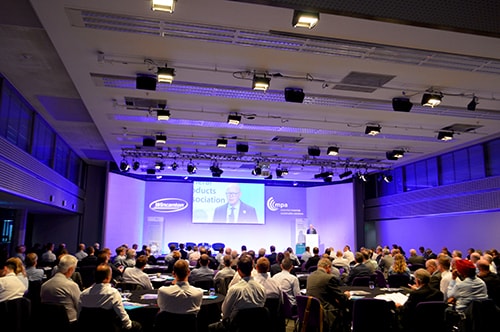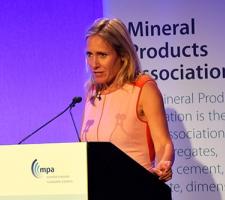
Speaking at the MPA’s 10th anniversary annual conference – ‘Mineral Products 2019 - Planning Long…Embracing Change' - before a packed audience, including many CEOs, from 90 different organisations spanning MPA member companies, NGOs, trade associations, consultants and government departments and agencies, Jackson said that outside of the Treasury and BEIS (Department for Business, Energy & Industrial Strategy) there is significant business comprehension deficit in political Westminster, which is “obvious and deeply worrying”.
He continued: “Some senior and influential politicians continue to ignorantly assert, wilfully generalise, over offer, and under deliver. Some still think if we don’t still leave the EU by the end of October, public trust in democracy will collapse. Could it get much worse? To cap it all, we appear to have been reduced to an unedifying political choice going forward: Eton Mess or Marxism; minority parties; or worst of all disenfranchisement.
“It is against this challenging backdrop that MPA members have had to protect their precious businesses – whether fourth generation SMEs or international – and survive. And survive they have, but not without the pain of major job losses and lower investment. They are resilient. Learning the lessons from the past and planning for the future. These are characteristics that seem elusive in current [British] politics. I pay tribute to our members, particularly over the last 10 years. Thank goodness for their determination and enterprise.”
Jackson said that in spite of 10 very tough and uncertain years, MPA members had continued to contribute significantly to Britain’s economy and quality of life. “The [mineral products] sector is essential - worth around £20 billion per annum, supporting over £500 billion in the supply chain, typically delivering one million tonnes of essential products each day, every day, every year. Indigenous, locally produced and supplied. The largest material flow in the economy, vital for our homes, schools, roads, and so much more.”
Hosted by journalist and BBC newsreader Sophie Raworth on Monday 24 June at the QEII Centre in Westminster, London, ‘Mineral Products 2019 - Planning Long… Embracing Change' included a diverse range of high-quality speakers and panel discussions.
Painting a picture of our digital future and Artificial Intelligence, Lindsay Herbert, author of Digital Transformation, gave her insight into digital innovation. Using examples from organisations including Harvard, the UN Refugee Agency,
William Zimmern, head of Global Macroeconomics at BP, and Professor Michael Grubb, professor of Energy and Climate Change at University College London (UCL) provided their insight into the latest developments in the energy sector. They answered questions about the effect of climate change, the increasing demand for oil, competition in the global oil market and sources of energy supply, including the contribution of renewable energy where solar power is expected to grow tenfold and wind power by fivefold.
Professor Vernon Bogdanor, research professor at the Centre for British Politics and Government, King's College London, gave delegates his views on what may be happening to our broken party politics and democracy, commenting on the shift to more parties and what this means in a first past the post system. On Brexit, he spoke about the clash between parliament and direct democracy and the future implications of our unwritten constitution.
Keith Waller, programme director, Transforming Construction Alliance and head of the government’s Construction Innovation Hub discussed the challenges and opportunities of delivering prefabricated and modular construction in concert with technology and digitisation. He outlined the Government’s wish to see public sector buildings adopt modern methods of construction in order to address skills shortages, improve productivity, drive down waste whilst speeding up construction. He stressed that there is a huge amount of diverse talent in engineering and we need new thought and greater diversity of thinking, not just reinforcing the old ways of doing things.
Dr. Matthew Free, director, Geohazard and Risk Management, Arup, considered urbanisation, some of the drivers behind global growth and what they may mean for the demands for construction aggregates going forwards, drawing on examples from China and Singapore. Pascal Peduzzi, director, GRID-Geneva,
Matthew Ray, deputy director of Business Frameworks, Department for Business, Energy and Industrial Strategy (BEIS) outlined the UK process and progress of the Extractive Industries Transparency Initiative (EITI) to which MPA actively participates. EITI is increasing general awareness about the extractive industries and their contribution to the economy.
In his event-closing remarks, Nigel Jackson said: “This conference attempts to address the bigger picture, the long term and strategic issues. Today’s excellent presentations confirm that the key issues considered all ‘join up’ and like it or not the industry must continue to continuously confront these complex challenges collectively.”
The MPA is the trade association for the aggregates, asphalt, cement, concrete, dimension stone, lime, mortar and silica sand industries. With the affiliation of













